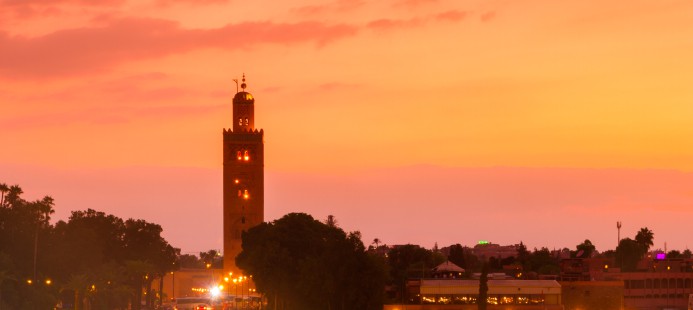Our Opinion: 2015
Eid Mubarak

As countries across the Middle East slide into deeper chaos, Morocco seems to be weathering the Arab uprisings, neither imploding nor imposing harsh repression.
Investors should take note. MENA (Middle East North Africa) investments were very fashionable a few years ago yet are now very out of vogue. The Casablanca stock market has proved remarkably resilient this year.
This stability seems strange. Poverty, corruption and youth unemployment – some of the problems that sparked the Arab Spring – are much in evidence in this North African kingdom.
Morocco has also been bloodied by violent extremism – in 2003 and 2007, suicide bombers linked to al-Qaida killed a total of 46 people in Casablanca. And the government believes that some 1,500 Moroccans are fighting for Isis in Syria, and pose a potential threat if they return home.
I know this country well. I am fortunate enough to have a holiday home here and I witness its contradictions at first hand.
One recent example was an outdoor music festival in May in the capital, Rabat. Amongst others, it featured Pharrell Williams, Usher, Sting, and Jennifer Lopez, performing in front of 160,000 cheering fans.
Some conservative Islamists – led by the Prime Minister – took offence at Lopez’s “sexually suggestive” and “disgraceful” performance and dress. It certainly lacked any cultural sensitivity. Rather than demonstrating or stirring up dissent – which would have been easy to do – they filed a lawsuit against the singer and her Moroccan promoter.
Moroccans say their long tradition of religious moderation is one of the main reasons the country is relatively stable. Many here follow the Maliki and Sufi traditions of Islam, perhaps the faith’s most tolerant strains.
The uprisings elsewhere in North Africa have also dampened calls for change and any criticism of the king.
However, big grievances remain. The economy is expected to grow by 4.6% this year. Yet, in this country of 33m, only 21,000 new jobs were created last year. Oddly, unemployment is highest among those who are young, urban and educated.
Morocco’s young king, Mohammed VI, should be credited. He assumed the throne in 1999 and moved quickly to end the widespread arrests, torture and disappearance of dissidents that marked the reign of his father. When the Arab Spring threatened neighboring governments, he gave up his ‘divine rights’, empowering a Parliament that has a say on all areas except national security, foreign policy and religious affairs, which remain his responsibility.
In 2011, in response to a wave of protests, he passed a new constitution and promised reforms. He co-opted the main Islamist party into government. Yet, most of the laws meant to give life to the new constitution are yet to be written. The press is tightly controlled.
Can the stability really last? A big question is whether corruption and unemployment will eclipse Mohammed’s political reforms.
The King’s big infrastructure projects have benefited only a tight circle of palace staff. Unless he moves to make his economy more competitive and democratic, most Moroccans “will remain suspicious of entrepreneurs, large businesses will remain suspect of cronyism and corruption, and growth will remain elusive,” according to Harvard economist Ishac Diwan.
For instance, the gulf between the cities and the countryside is staggering. Tens of thousands of vulnerable women toil for low wages as seasonal workers picking fruit to be exported to Europe. And the education system eats up a staggering 25% of the national budget but is still ranked as one of the worst in the region. Golf courses and luxury property developments are mushrooming across the country, emphasizing the deep inequality.
Morocco is important to the US, which relies on the King’s intelligence services to help track the growing terrorist threat in the region. The country has also has joined the anti-Isis coalition, cracking down hard on Isis members and sympathisers across the country.
In addition to military aid, Washington has provided more than $1bn in assistance since 2007 to boost employment.
Both Moroccan and Western experts say it’s too soon to judge whether the King’s campaign to counter Islamic extremism is working. That extremism thrives on inequality that is all too evident here. The King himself has said the country cannot have “a two-speed system in which …the poor are excluded from the development process.”
But to create more jobs, Morocco must fight corruption, open up its economy and break monopolies. The question is whether the palace can foster fairness and openness without giving up some of its vast power and privileges.
So far, Morocco has been lucky. Low oil prices have made it easier to reduce fuel subsidies. Worsening regional problems, such as terrorism and illegal immigration, have given the kingdom greater negotiating power with Europe, which needs its co-operation on precisely these issues.
The country is under little pressure, whether from foreign allies or citizens, to pursue real change. But that does not mean it shouldn’t. And when it does, it has the potential to be the economic powerhouse of North Africa.
In the meantime it is, as always, a real pleasure to be here – particularly to witness the Eid festivities marking the end of Ramadan. The mosques were full in celebration today. And the nightclub I just left was doing a roaring trade too. It is that contrast of conservative values and outward looking modernity that makes this country so appealing to me. And to investors too.
Eid Mubarak!
